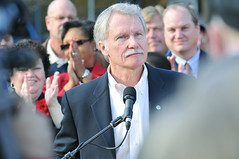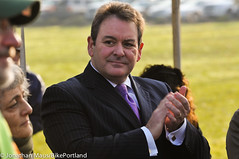“The big lesson here is, we don’t need massive and costly road capital projects.”
— Governor Kitzhaber in 1997 after a 6-day closure of the I-5 bridge didn’t result in the massive traffic jams everyone predicted.
The effort to resurrect the Columbia River Crossing project is making our heads spin. While citizen activists and non-profit groups who are against the project make last-ditch efforts to contact their legislators and try to not make the mistakes they made last time, the powerful forces that rammed the project through Salem last March are up to their same old tricks. Meanwhile, high-profile critics of the project are doing their best to snuff it out.
While we’ve never attempted blow-by-blow reporting of this issue (I recommend The Columbian and the Willamette Week for that), there are a few things that have come across my desk recently that I feel are worth sharing…
The first is a quote from Oregon Governor John Kitzhaber that shows just how far he’s come in his thinking about the merits of investing billions of dollars into massive highway expansion projects. The quote was found by reader Peter Welte and it came from a fascinating article (given the current CRC discussion) published in The Oregonian on September 23, 1997 titled, Closure of I-5 bridge demonstrates transit’s value.

massive highway expansion projects governor?
(Photo © J. Maus/BikePortland)
The set-up for the article is the classic “carmageddon” scenario we’ve seen play out recently in Los Angeles and elsewhere. Facing a multi-day closure of a major freeway, officials prepped for the worst. In this case, “traffic jams as long as 40 miles.” But as it turned out, people simply changed their habits and the result was “the evaporation of traffic.” That phenomenon spurred some amazing quotes from Kitzhaber and local officials in Vancouver.
Here’s what the City of Vancouver’s traffic engineer said at the time:
“I think that this has shown that there is an incredible amount of capacity in our existing system, should people decide to use it in a different way than they’re using it today.”
And Governor Kitzhaber (yes, he was governor back then too) — who has been pushing hard for the CRC — had this to say:
“The big lesson here is, we don’t need massive and costly road capital projects.”
Our next item is also noteworthy for its word choices.
Check out this interesting event coming up at the Red Lion on Hayden Island next month. The event, which will be co-presented by the City Club of Portland and the Columbia Corridor Association (a non-profit that promotes freight and trade) is dubbed, The New Columbia River Crossing. The format looks to be an informal discussion led by Oregon Department of Transportation Director Matt Garrett. Garrett is a firm believer in the CRC who has carried ODOT’s water on the project for many years.

rather not rehash the past
when it comes to the CRC.
(Photo © J. Maus/BikePortland)
The fact that Garrett going out in the public to extoll the virtues of the project isn’t surprising. What surprises me about this event is the language used to promote it and the fact that it’s not scheduled to happen for another month.
Here’s how event organizers set the context (emphases mine):
The Columbia River Crossing (CRC) is a massive planning effort to accommodate the needs and wishes of commuters, mass transit riders, bicyclists, and freight haulers in one earthquake-safe crossing on a budget. That would be a lot to ask, even if it didn’t also involve the Coast Guard, an historic airfield and your usual assortment of advocates and politicians. It’s little wonder that the project has stumbled.
Regardless of what happens to the CRC we all know, there’s a need to improve this weakest link in the entire interstate highway system. What will those improvements look like? How can we insure the conversation between Vancouver and Portland will be productive? Join us for a look forward, with no rehashing of the past.
Wow. It’s as if whoever wrote this (and it was almost surely OK’d by Garrett and ODOT) is already making excuses and covering their butts for all the money wasted in planning the project. I find it fascinating they would try to dismiss/excuse the failures of this project has even after spending $200 million or so in taxpayer money on consultants and planning. And the “regardless of what happens” and “a look forward” parts make it appear to me that insiders like ODOT, the CCA and Garrett are already starting to work on the project’s post-mortem spin.
And remember, if you attend, there’s a “no rehashing of the past” rule which means Garrett would rather not speak to any of the shenanigans or controversy that have hung around the neck of this project for years.
As for scheduling the event for October 23rd, that too seems odd given that project backers themselves had initially claimed September 30th was the deadline for action (although that has been pushed back a bit now). The language of the event flyer, combined with this date, sure makes it seem like ODOT and other pro-CRC forces are adjusting their tactics from supporting a project, to supporting a positive narrative about a failed project that makes them look less bad for being on the losing side.
Of course, my entire analysis of this could be a failure too.
And finally today I wanted to share some actual news and recent reporting. The Willamette Week has done a great job following the big pieces to the story. Their latest on what Oregon State Treasurer Ted Wheeler thinks about the project is a must-read.
Stay tuned. Hopefully we’ll know the ultimate fate of the CRC in the next few weeks.

